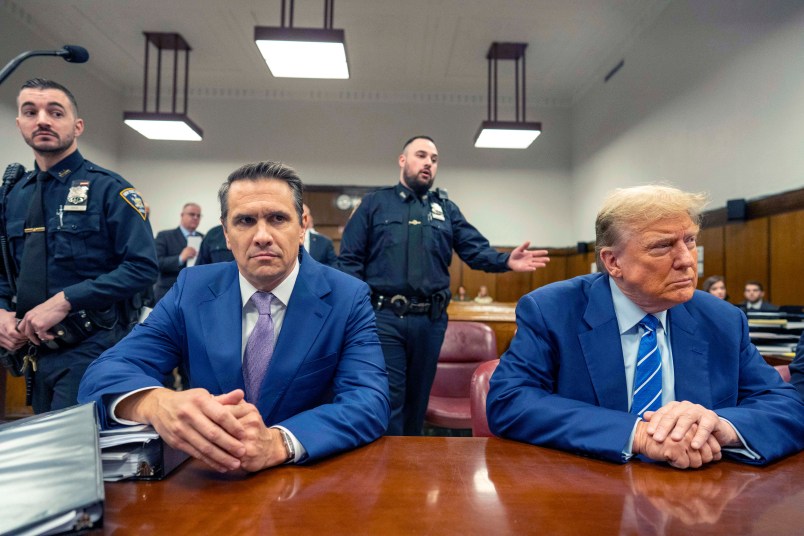The White House has been unusually public (and repetitive) with its stance on the debt ceiling: that it simply will not negotiate with Republicans on future cost cutting while those same Republicans have a gun to the head of the global economy.
“Like the President has said many times, raising the debt ceiling is not a negotiation; it is an obligation of this country and its leaders to avoid economic chaos,” White House Press Secretary Karine Jean-Pierre said in a recent statement.
Clearly having learned the lesson of the 2011 impasse, the White House has been unequivocal on its refusal to bargain with terrorists. It’s also striven to clarify what Republicans purposefully muddle: that lifting the debt ceiling is about paying out past allocations, not limiting future spending.
That stance became the biggest moment at Tuesday’s State of the Union speech, when President Joe Biden turned Republican heckling around on his opposition, seeming to successfully extract a public commitment not to cut to Medicare and Social Security — something various members have floated as the policy concession they want in exchange for not letting the country default.
“So as we all apparently agree — Social Security and Medicare are off the books now,” he said in response to Republican boos after he mentioned the demands. “Alright — we’ve got unanimity!”
But because the debt ceiling is a perennial magnet for bad faith, bad coverage and bad strategy, the newest round of lawmakers cajoling Biden to negotiate is once again shifting the onus from the people threatening to detonate the economy to the person telling them to knock it off.
“We are very divided right now,” Rep. Nancy Mace (R-SC) said recently on NBC’s Meet the Press. “We have $31 trillion of debt. The responsible thing to do would be to get to the table with Republicans and negotiate a way.”
Mace, whose party is contemplating a ploy that could send the United States into a deep recession and drag down the global economy for starters, accuses Biden of irresponsibility. That House Republicans have proven incapable of producing a list of which spending cuts they all actually want only further complicates the impossible proposition.
Some Republicans, including Rep. Chip Roy (R-TX), willfully misinterpreted Biden’s meeting with House Speaker Kevin McCarthy (R-CA) as proof that Biden is willing to negotiate on the debt ceiling. Others, like Rep. Brian Fitzpatrick (R-PA), considered Biden’s refusal to negotiate as an abdication of “leadership” — of a party that he doesn’t lead.
Rep. Michael McCaul (R-TX), offering himself as the bigger man, said he’s ready to talk with Biden right now about the nonexistent Republican demands.
“I’m ready to sit down with President Biden today to talk about a reasonable debt ceiling, which would mean meaningful spending cuts,” he said on CNN. “The fact is we should be having these conversations right now.”
Some Democrats, including those at the White House, have allowed that they will debate budgetary matters when it comes time to pass the budget, a process that involves both Congress and the White House and where negotiations between the parties will inevitably have to happen to get the bill through both chambers. Their line in the sand is that they won’t negotiate now, under threat and duress.
But that positioning, by the lights of the beltway press, doesn’t get Democrats out of the bind either.
“The White House wants to rhetorically separate any discussion about the debt limit from the federal spending debate, but that’s a distinction without a difference,” remarked D.C. newsletter Punchbowl News. “It’s clear that the two issues are linked. Biden is going to have to negotiate with Republicans – and already is.”
The issues are only linked because Republicans have linked them, and because acquiescent reporters are willing to refract that spin as fact.
But Republicans aren’t the only ones spewing bad faith on a subject with enormous potential ramifications. Some Democrats, helpfully, are also carrying water for the Republicans, and conflating the budget negotiations with the debt-ceiling hostage situation.
“This is a democracy that we have. We have a two-party system,” Sen. Joe Manchin (D-WV) said on CNN’s State of the Union. “And we should be able to talk and find out where our differences are. And if they are irreconcilable, then you have to move on from there and let the people make their decisions.”
Implicit in Republicans’ strategy is their “decision,” if the White House hypothetically rejected their proposed cuts to Medicare or Social Security or whatever else, to let the country default.
Manchin’s House-side shadow made a similar case.
“I’m optimistic they will sit down, as this White House always has, and that’s why we were able to accomplish so much in a bipartisan way last Congress. It takes constructive conversation,” Rep. Josh Gottheimer (D-NJ) said on Fox News Sunday, adding that some cuts — to Medicare or Social Security — would be “unreasonable.”
The “debate” over the debt ceiling is not confusing. House Republicans, despite their relative powerlessness in controlling just one chamber, know that Democrats need a handful of their votes to raise or suspend the debt ceiling and avoid default. Following in the footsteps of their Tea Party forebears, today’s Freedom Caucus has seen that procedural hike used as a political cudgel to exact policy changes they’d have almost no chance of passing through regular order. The White House is responding that it will not unilaterally make such concessions, and that it’s extreme, radical behavior to even flirt with an action that would wreak havoc on so many innocent people.
For years and through many iterations of this high-stakes game of chicken, Republicans have avoided the full-throated, public condemnation they deserve by shifting the blame and feigning fiscal responsibility, which some media entities will uncritically amplify.
We’ve seen this movie before. But with a Republican Party in increasing thrall of its right-most flank, and an enduring lack of real-time consequences for its behavior, we may see a different ending.










